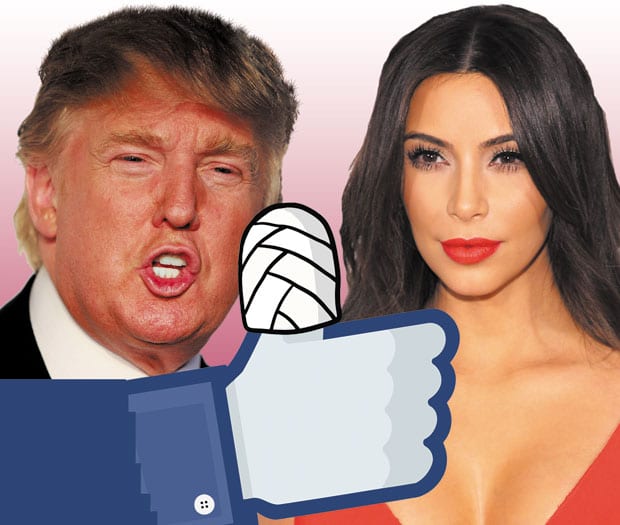Being a reality star doesn’t qualify you as an entertainer nor as president

 In modern times, we have the luxury of witnessing history being made through mass and social media. We can watch a presidential candidate’s every move on the campaign trail or see our favorite reality stars’ lives play out on camera, whether it be staged or not. The Internet, television, extended cable and the 24-hour news cycle have dramatically increased the world’s ability to see, hear and experience every conceivable reality on earth.
In modern times, we have the luxury of witnessing history being made through mass and social media. We can watch a presidential candidate’s every move on the campaign trail or see our favorite reality stars’ lives play out on camera, whether it be staged or not. The Internet, television, extended cable and the 24-hour news cycle have dramatically increased the world’s ability to see, hear and experience every conceivable reality on earth.
It started with radio. Then came television, giving viewers the ability to see and hear what was happening all around the world as it was happening. Both radio and television dramatically changed not just national life, but home life. The living room would never be the same.
Now the Internet has taken the top spot for audience and engagement, due in large part to social media. However, instead of one medium usurping the other, they’ve reached a point of synergy, wherein media use all of their outlets together to achieve their goal: to entertain, to inform, to influence and (most importantly) to sell.
Since content online is so high in volume, it can seem like an assault, an onslaught of material that is impossible to sort through. Therefore, we edit. We edit ourselves, and we allow the content providers and powers that be to edit for us. But it’s all of us, together, who collectively drive the machine. After all, we won’t continue to consume that which we don’t want.
There are plenty of failed attempts to sell the pubic on something that was flatly rejected; think about the Internet’s (and box office’s) rejection of an all-female Ghostbusters cast or the public’s (and Congress’) resistance to Barak Obama’s gun control measures. Ultimately, it is “the people” who decide when and where change happens.
It’s very democratic at its best, but at its worst, dangerously ill-informed herd-like behavior. As Winston S. Churchill once said, “The best argument against democracy is a five-minute conversation with the average voter.”
These democratic decisions collectively made by a society result in what television shows continue to air, who we hold to high esteem, who makes the covers of magazines, which type of movies continue to get made, which companies get our money and — most importantly — who runs our country.
Today, we can see where our national values lie based on what is being produced by the media and subsequently consumed by the public. If an alien from outer space were to land in the United States he/she/it might mistakenly — or maybe accurately? — assume that Kim Kardashian is our most revered citizen, that twerking is the national dance and that Donald Trump is what we consider presidential material.
Just like that alien, our children are entering the world fresh-faced and bright-eyed, absorbing everything around them.
Are these really the messages we want them to hear?
Like Kim Kardashian, Donald Trump is on television at any given moment, ever so slightly influencing us through words and action. Thousands of videos are available at our fingertip to show what Kim and Donald are up to, who they are feuding with. The news headlines are full of Kim’s feud with Taylor Swift and with Trump’s latest ill-informed rants about Hillary’s supposed incompetence.
Trump and Kim Kardashian are similar in that they symbolize a shift in definitions, priorities and what we’re willing to accept as national news. Kim represents our changing definition of what it means to be an entertainer; Donald highlights our acceptance of entertainers and businessmen as politicians (or our inability to know the difference).
Neither Kim nor Donald is very good at what their supposed roles — entertainer or politician — traditionally imply. But both, for some reason, continue to mesmerize the public. Kim can’t — won’t? — sing or act or dance. Donald does not seem to know or care to learn about issues that previously seemed like prerequisite knowledge for an American president. And still, Americans gobble up the news on gossip websites about Kim’s new haircut or booty pic, while major news outlets run months-long coverage of Donald Trump’s controversial tweets.
What brought us to the point? Is it a good place to be?
I say no. And I say that both Kim Kardashian and Donald J. Trump are the result of an American public that is becoming increasingly fickle and ill-informed about national issues and what we consider art.
The Kardashians of the world for many people. And I understand the escapism that those people seek by incessantly following reality stars’ every move.
But we cannot apply that same frivolity to the race for president of the United States, or to any democratic election at any time. Following Donald Trump on Twitter does not make you informed on the issues of the day; just like hosting the Miss Universe pageant doesn’t make you an expert on foreign policy – an argument Trump has tried to make.
So, I passionately implore all voters to inform themselves on the issues at hand and truly consider the decision we are about to make. I hope that drawing the connection between our national obsession with Donald Trump and Kim Kardashian will help you draw the line between an unqualified entertainer and a life-long public servant.
This article appeared in the Dallas Voice print edition August 26, 2016.

